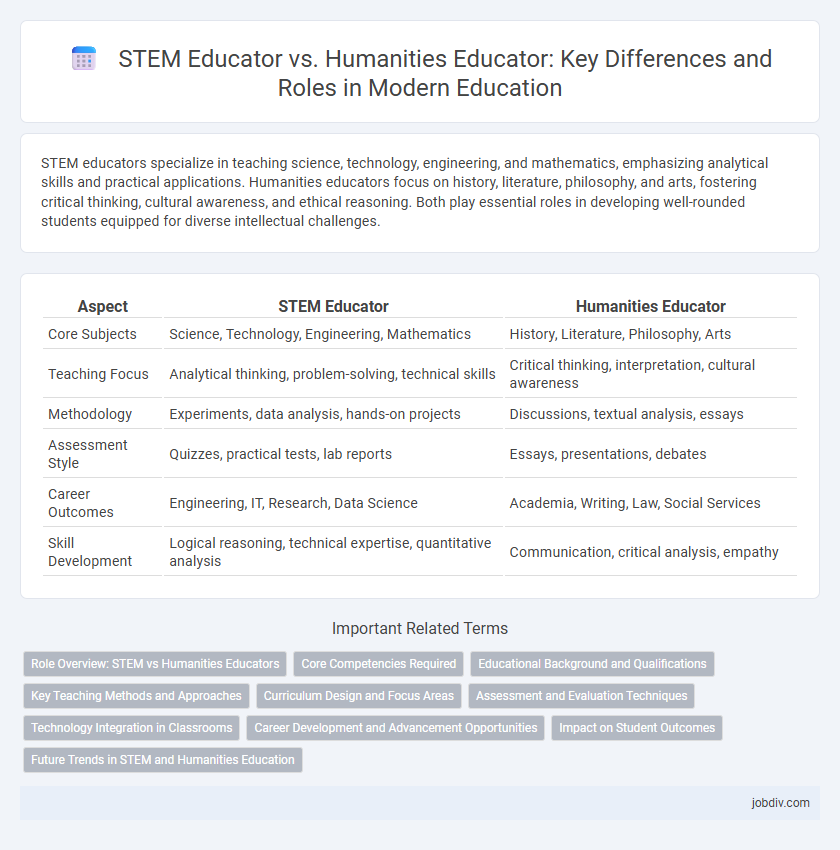STEM educators specialize in teaching science, technology, engineering, and mathematics, emphasizing analytical skills and practical applications. Humanities educators focus on history, literature, philosophy, and arts, fostering critical thinking, cultural awareness, and ethical reasoning. Both play essential roles in developing well-rounded students equipped for diverse intellectual challenges.
Table of Comparison
| Aspect | STEM Educator | Humanities Educator |
|---|---|---|
| Core Subjects | Science, Technology, Engineering, Mathematics | History, Literature, Philosophy, Arts |
| Teaching Focus | Analytical thinking, problem-solving, technical skills | Critical thinking, interpretation, cultural awareness |
| Methodology | Experiments, data analysis, hands-on projects | Discussions, textual analysis, essays |
| Assessment Style | Quizzes, practical tests, lab reports | Essays, presentations, debates |
| Career Outcomes | Engineering, IT, Research, Data Science | Academia, Writing, Law, Social Services |
| Skill Development | Logical reasoning, technical expertise, quantitative analysis | Communication, critical analysis, empathy |
Role Overview: STEM vs Humanities Educators
STEM educators focus on teaching subjects such as mathematics, science, engineering, and technology, emphasizing critical thinking, problem-solving, and practical applications. Humanities educators specialize in disciplines like literature, history, philosophy, and the arts, fostering analytical skills, cultural understanding, and ethical reasoning. Both roles require adaptability and in-depth subject knowledge but differ in pedagogical approaches and learning outcomes tailored to their respective fields.
Core Competencies Required
STEM educators require strong competencies in scientific literacy, analytical thinking, and proficiency in technology integration to foster critical problem-solving skills. Humanities educators emphasize skills in critical analysis, cultural awareness, and effective communication to nurture interpretive thinking and empathy. Both roles demand adaptability, pedagogical expertise, and the ability to engage diverse learners through content-specific methodologies.
Educational Background and Qualifications
STEM educators typically hold degrees in science, technology, engineering, or mathematics fields, often complemented by specific certifications in teaching methods for these disciplines. Humanities educators usually have academic backgrounds in literature, history, philosophy, or social sciences, frequently possessing advanced degrees that emphasize critical thinking and cultural analysis. Both require pedagogical training, but the specialization of their educational backgrounds distinctly shapes their teaching approaches and classroom expertise.
Key Teaching Methods and Approaches
STEM educators prioritize hands-on experiments, project-based learning, and analytical problem-solving techniques to foster critical thinking and innovation. Humanities educators emphasize discussion-based learning, critical reading, and interpretive analysis to develop empathy and cultural awareness. Both approaches cultivate essential skills by tailoring pedagogy to the cognitive and creative demands of their respective disciplines.
Curriculum Design and Focus Areas
STEM educators emphasize curriculum design centered on scientific inquiry, technology integration, engineering principles, and mathematical problem-solving to develop critical thinking and innovation skills. Humanities educators focus curriculum on cultural analysis, critical reading, ethical reasoning, and effective communication to foster historical perspective and empathy. Both disciplines tailor content and pedagogical strategies to align with cognitive development theories and career readiness in their respective fields.
Assessment and Evaluation Techniques
STEM educators often utilize formative assessments like quizzes, lab reports, and standardized tests to measure quantitative understanding and practical application of scientific concepts. Humanities educators prioritize qualitative evaluation methods such as essays, reflective journals, and oral presentations to assess critical thinking, interpretation, and argumentation skills. Both disciplines incorporate rubrics and peer assessments to ensure consistent, objective grading and foster self-regulated learning among students.
Technology Integration in Classrooms
STEM educators leverage advanced digital tools and coding platforms to enhance problem-solving skills and promote interactive learning in science, technology, engineering, and math subjects. Humanities educators integrate multimedia resources and digital archives to foster critical thinking and contextual analysis of literature, history, and philosophy. Both approaches emphasize technology integration to create dynamic, student-centered learning environments that prepare learners for the digital age.
Career Development and Advancement Opportunities
STEM educators benefit from rapidly growing career development opportunities driven by high industry demand and technological advancements, often leading to roles in research, curriculum design, and educational technology. Humanities educators face diverse advancement options through specialized fields such as cultural studies, literature, and critical thinking, with potential careers in academia, publishing, and educational policy. Both paths require continuous professional development and offer unique contributions to interdisciplinary education and student skill-building.
Impact on Student Outcomes
STEM educators enhance student outcomes by fostering critical thinking, problem-solving skills, and technological literacy, which are essential for careers in science, technology, engineering, and mathematics fields. Humanities educators improve outcomes by developing students' analytical reasoning, communication abilities, and cultural awareness, promoting empathy and ethical understanding. Both disciplines contribute uniquely to holistic intellectual growth, with STEM driving innovation and humanities nurturing societal and emotional intelligence.
Future Trends in STEM and Humanities Education
STEM educators are increasingly incorporating Artificial Intelligence, robotics, and data science to prepare students for technology-driven careers, emphasizing hands-on learning and interdisciplinary skills. Humanities educators are expanding their focus on digital literacy, ethical reasoning, and cultural competence to address complex societal challenges and foster critical thinking in a globalized world. Both fields are integrating online platforms and hybrid teaching models to enhance accessibility and personalized learning experiences.
STEM Educator vs Humanities Educator Infographic

 jobdiv.com
jobdiv.com